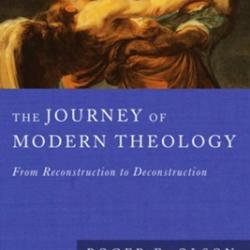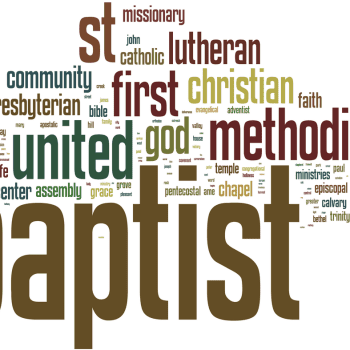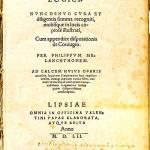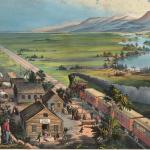I Interrupt This Series with a Sidebar about “Folk Religion”
Actually, it’s not so much an interruption as a long footnote to my ongoing series about theology. Many have asked what I mean by “folk religion.”
I first learned the concept from sociologist and historian of religion Robert Ellwood, author of many books especially about American religions. I expand on his definition and description.
Some years ago I wrote a book entitled Answers to All Your Questions: The Journey from Folk Religion to Examined Faith (Zondervan). There I explain and illustrate folk religion especially as it manifests among American Christians.
So what do I mean by “folk religion” and why do I consider it bad?
Folk religion is religion that thrives on an anti-intellectual preference for comforting clichés such as “God always has a plan” without examining them for their truth content. Most such clichés have some truth and I explain that in my book. The problem is that they are in and of themselves insufficient to deliver the whole truth (that can be delivered and needs to be delivered).
Folk religion may be “found” on bumper stickers, walls (e.g., wood “plaques” with cute sayings on them), in songs, stories, “evangelegends,” sermons, conversations. Folk religion resists any critical examination of such clichés or the beliefs they express.
*Sidebar: The opinions expressed here are my own (or those of the guest writer); I do not speak for any other person, group or organization; nor do I imply that the opinions expressed here reflect those of any other person, group or organization unless I say so specifically. Before commenting read the entire post and the “Note to commenters” at its end.*
When I was growing up in church we sometimes heard a song sung: “If I Am Dreaming, Let Me Dream On” by evangelist Gypsy Smith. The gist of the song is that if Christianity is just a “dream” (as Smith was told by a skeptic), it’s a good one and the person enjoying the song would rather “dream” than know truth.
The key thing is resistance to critical examination even from sound biblical exegesis and hermeneutics. Even concepts like “biblical exegesis” and “hermeneutics” are despised by folk religionists.
Folk religion thrives on traditions handed down and passed around that have little or nothing to do with the Great Tradition of Christian thought. And folk religion reacts very negatively when someone challenges the cherished tradition of belief—even on the basis of known facts.
Some years ago an evangelegend was going around among American evangelical Christians that Russian scientists had drilled the deepest hole into the earth ever and had found hell. They could hear the screams of the burning souls and feel the heat coming up—not from the earth’s core but from hell “down there.” I tried to tell a few people who believed this story that it had been proven to be invented by skeptics who wanted to show how gullible Christians are. I was harshly shut down.
I could give dozens of examples. Another one has to do with the “Satanic panic” of the 1970s and 1980s. A particular man who claimed to have been a high priest of a Satanic temple wrote a popular book about it and about his conversion to Christianity. The whole story was debunked in Christianity Today. I attempted to tell the owner of a local Christian bookstore that the book was untrue and he should not be selling it. He virtually expelled me from his store. The first time I read the book I knew it wasn’t true. It had the “rink of untruth” about it.
An evangelist was speaking about a man who despised his ministry but turned around and contributed money to him. Several times he said “And as the Bible says, may his tribe increase!” Someone on the platform behind him finally stepped up and whispered in his ear. The evangelist said “I’m told that’s not in the Bible. Well, if it isn’t, it should be!” The crowd of the evangelists’ followers applauded.
Folk religion is fiercely anti-intellectual; it demeans the life of the mind, critical thinking, in favor of believing whatever sounds spiritual, gives comfort, feels good, or “has always been told.” Or it is so enamored with a particular spiritual writer or speaker that it gives him or her absolute authority to govern beliefs even if what is being said is absurd.
Need I go on? Anyone who has deep and direct acquaintance with large segments of American Christianity has to recognize what I am talking about.
Another anecdote. I know a man who told me not only that “There is no salvation without the King James Bible” but also that Catholics cannot be Christians because they “worship food.”
Yet another. I heard a well-known evangelist say to an audience “If it’s new, it can’t be true; if it’s true, it can’t be new” and “Before we can get the people out of the slums we have to get the slums out of the people.” His audience ate it up. I read this evangelist’s books and found that he was uneducated and ill-informed about the subjects about which he wrote. And yet, I personally knew people who considered every word that dropped from his pen or mouth true beyond doubt.
For my folk religion acquaintances, the sole fact that I attended seminary was enough to shun me as subchristian at best.
One day, while in seminary, I was sitting at a table in the dining hall of a summer Christian church camp for youth. I was there as the youth pastor of a large group of teens. I was sitting with about ten other, mostly older, pastors during the campers’ recreation time. One of the pastors was spouting absolute nonsense, even bordering on heresy. What he was saying was closer to Gnosticism than to orthodox, biblical Christianity. I dared to kindly, humbly correct some of what he was saying. Immediately all of the pastors stood up and walked away from me.
Yes, that was partly because of my youth, but it was also evidence of folk religion—a typical kind of reaction of folk religion to any critical examination or correction even from the Bible itself.
Someone has asked me to define more clearly and exactly “folk religion.” Like the famous or infamous Supreme Court judge said about pornography “I can’t define it but I know it when I see it.” Once you know what folk religion is, you see and hear it all around in American Christianity. It is the default religion of most American Christians. And it gives Christianity a bad name; it gives skeptics and critics of Christianity the proverbial “rope.” It diminishes Christianity’s “voice” in the public square. It opens Christianity up to valid ridicule.
*Note to commenters: This blog is not a discussion board; please respond with a question or comment only to me. If you do not share my evangelical Christian perspective (very broadly defined), feel free to ask a question for clarification, but know that this is not a space for debating incommensurate perspectives/worldviews. In any case, know that there is no guarantee that your question or comment will be posted by the moderator or answered by the writer. If you hope for your question or comment to appear here and be answered or responded to, make sure it is civil, respectful, and “on topic.” Do not comment if you have not read the entire post and do not misrepresent what it says. Keep any comment (including questions) to minimal length; do not post essays, sermons or testimonies here. Do not post links to internet sites here. This is a space for expressions of the blogger’s (or guest writers’) opinions and constructive dialogue among evangelical Christians (very broadly defined).












